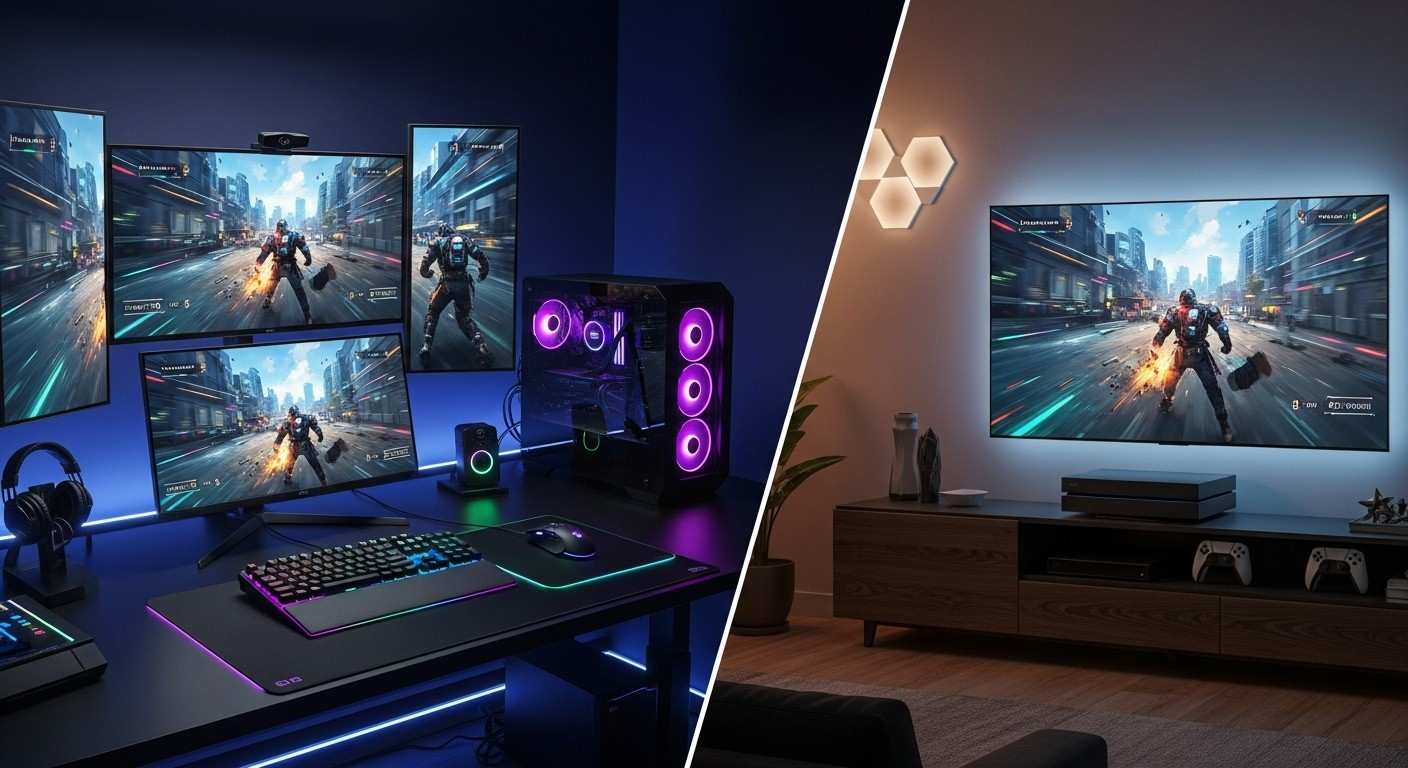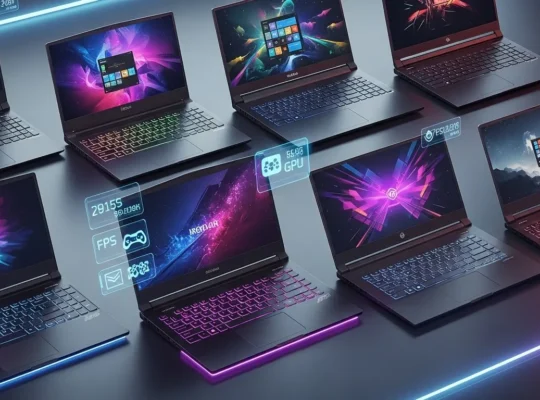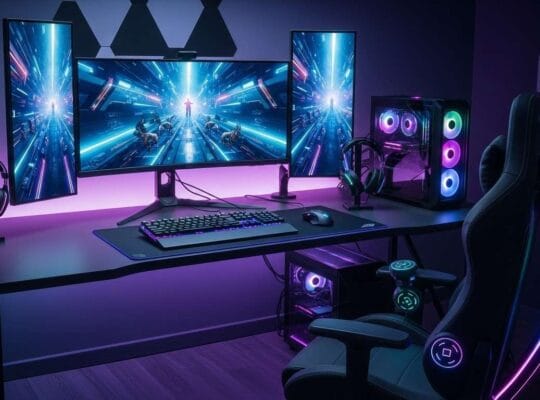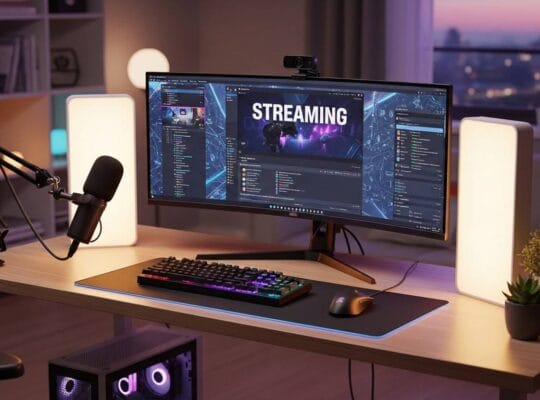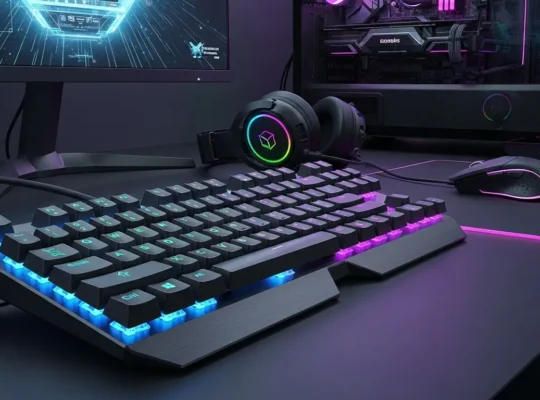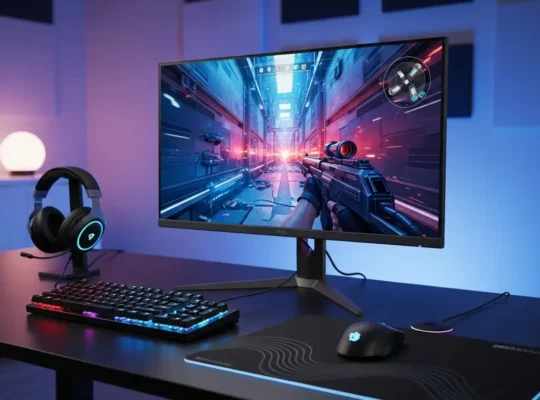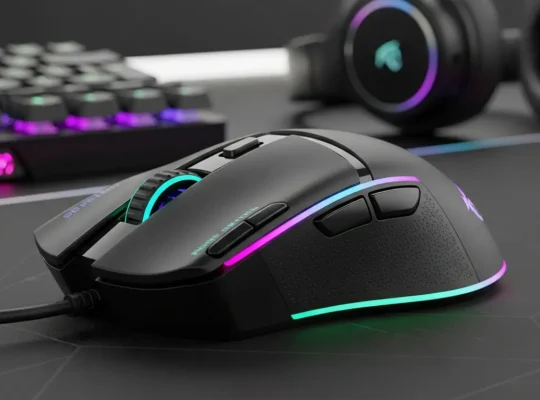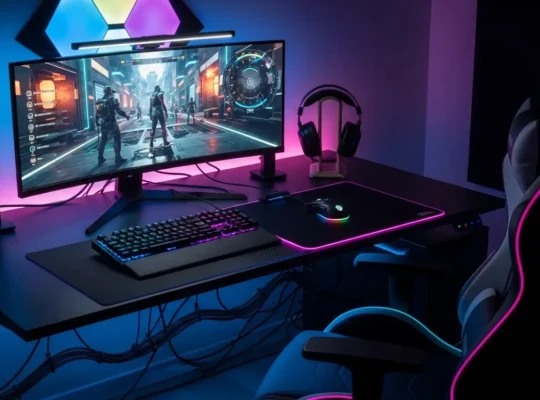Affiliate Disclosure
As an Amazon Associate, I earn from qualifying purchases. This helps support the blog at no extra cost to you.
Thinking About Upgrading? Compare the Best Gaming PCs and Consoles of 2025
Quick Links
ToggleIn 2025, the debate over PC vs Console Gaming is more alive than ever.
- Performance and Graphics: PC Takes the Crown
- If you want the absolute best performance with the highest frame rates and graphical settings, a PC is the winner. You can upgrade components like the graphics card (e.g., an RTX 5080) for elite-level gameplay.
- Consoles like the PS5 Pro and Xbox Series X offer impressive, stable performance right out of the box, but you can't upgrade their internal hardware.
- Cost: Cheaper Start vs. Long-Term Value
- Consoles are more affordable upfront, making them easier to get into.
- A gaming PC has a higher initial cost, but offers better long-term value because you can upgrade individual parts over time instead of buying a whole new machine. The article mentions the Skytech Azure Pre built PC as a great, hassle-free option that balances performance and cost.
- Games and Exclusives: The Biggest Deciding Factor
- PlayStation is the champion of cinematic, single-player exclusive titles like God of War Ragnarok and The Last of Us Part III.
- PC offers the largest overall library, with access to Steam, Xbox Game Pass, indie games, and a massive modding community that can completely transform games.
- The Nintendo Switch remains the go-to for portable and family-friendly gaming.
- Online Gaming: PC is Generally Free
- To play multiplayer games online with a PlayStation or Xbox, you need to pay for a subscription (PS Plus or Xbox Live).
- On PC, online multiplayer is typically free, which can save you a lot of money over time.
- Customization vs. Simplicity
- PC offers unmatched freedom. You can customize everything from your hardware and software to your desk setup with RGB lighting and dual monitors.
- Consoles are built for ease and simplicity. Just plug them in, grab a controller, and you’re ready to play.
- For Casual Players & Big Exclusives: A console is a perfect, hassle-free choice.
- For Competitive Gamers, Streamers & Tinkerers: A PC is the superior tool for its power, flexibility, and control.
Is a PC considered a console?
Not quite—and that’s where this classic gaming debate begins. Whether you’re saving up for a high-performance gaming rig or eyeing the latest console deals, choosing between console vs PC gaming in 2025 can be overwhelming. And you’re not alone.
Whether you’re deciding between a PS5 Pro and a custom gaming PC, this guide covers performance, cost, exclusives, and future-proofing to help you choose your perfect setup.
As a content strategist and gamer with 5+ years of SEO experience, I’ve seen this debate evolve—and trust me, it’s not going anywhere. According to Newzoo’s 2024 report, 65% of gamers actively compare both platforms before buying. So, let’s break down the key factors: performance, cost, exclusive titles, and everything in between. I’ll also answer some of the most asked questions on Google, in plain English, so you can finally decide which gaming setup is right for you.
I’ve personally wrestled with this choice for years, starting with a PlayStation 2 in my childhood, then dabbling in PC gaming during my university days, and now I find myself navigating the strengths and weaknesses of both platforms daily. My own journey through countless hours of God of War on console and Cyberpunk 2077 on PC has given me a deep appreciation for what each platform offers, and frankly, a bit of a headache trying to pick a definitive winner.
Instantly see if your computer can run a specific game with our new PC Requirement Analysis Tool.
At a Glance: PC vs Console Quick Comparison
| Feature | PC | Console |
|---|---|---|
| Performance | Highest FPS, upgradeable | Stable but fixed |
| Cost | Higher upfront, cheaper long term | Cheaper initially |
| Game Library | Largest, mod support | Best exclusives |
| Online Fees | Mostly free | Requires subscription |
| Customization | Unlimited | Plug and play |
| Ideal For | Streamers, pros | Casual, families |
Performance and Graphics: PC vs Console Power in 2025
When comparing PC vs console gaming performance, the gap in 2025 is clearer than ever. One of the biggest reasons players lean toward PC gaming is performance. In 2025, even entry-level PCs can hit 1080p at 60 FPS, and mid-range builds are delivering buttery-smooth 1440p or 4K with ray tracing. Add a top-tier graphics card like the RTX 5080, and you’re well into eSports-level frame rates.
Consoles like the PS5 Pro and Xbox Series X are no slouches either. They offer consistent performance out-of-the-box, often capped at 60 FPS or 120 FPS for certain titles. But you can’t upgrade a console—what you buy is what you’re stuck with.
- PC gaming offers scalable performance with GPU, CPU, and RAM upgrades
- Consoles provide optimized, stable gameplay across all supported titles
- PCs support ultra-wide monitors, VR headsets, and multi-display setups
NeoGaf Studies of console vs PC performance show PCs typically have end-to-end latency of 20–30 ms, compared with 60–100 ms on consoles, especially when using TVs. That raw speed edge adds up in reflex-heavy games like FPS and fighting titles.
| Spec | PC (RTX 5080 Build) | PS5 Pro | Xbox Series X |
|---|---|---|---|
| Resolution | 1440p–4K | 4K | 4K |
| Frame Rate | 120–240 FPS | 60–120 FPS | 60–120 FPS |
| Upgradeable | Yes | No | No |
| Input Latency | 20–30 ms | 60–100 ms | 60–100 ms |
I remember upgrading my PC’s graphics card from an RTX 2070 to an RTX 4070 a few years back, and the immediate jump in frame rates and visual fidelity in Cyberpunk 2077 was astounding. It completely transformed the game, allowing me to finally experience it at its full potential, something I could never do on a fixed-hardware console.
Cost Comparison: Console vs Gaming PC in 2025
- Consoles (PS5, Xbox Series): $299–$499 — plug-and-play, low setup cost
- Entry-Level Gaming PC: $800–$1000 — solid performance, upgradeable
- Mid-Range PC: $1200–$1500 — 4K gaming ready, long lifespan
- Long-term savings: cheaper games on Steam and bundles
Need help building your first rig? Read our Ultimate Gaming Gear Guide 2025
When analyzing the console vs PC cost in 2025, PCs deliver better long-term value through modular upgrades.
Industry insights from PC Gamer note that PC gaming revenue has surged 20%, while console sales have stagnated since 2021—making PC not only a performance choice, but a growing long-term investment.
My initial investment in a gaming PC felt steep, around $1200 including peripherals, but over the years, I’ve only spent a fraction of that on upgrades, typically just a new graphics card every few years. Meanwhile, my console-only friends have bought multiple new console generations to keep up, ultimately spending more in the long run.
Still deciding your platform? Our Ultimate Gaming Gear Guide 2025 covers what you need for both setups.
How to Choose: Is a PC or Console Better for You in 2025?
The endless console vs pc gaming debate isn’t about finding a single “best” platform, but about finding the one that’s best for you. Your budget, the types of games you play, and your technical comfort level are what truly matter. Let’s break down which gaming setup is right for different kinds of players.
You should choose a CONSOLE if…
- You prioritize simplicity and ease of use. Consoles are the definition of “plug-and-play.” There are no drivers to update or graphics settings to tweak. You can get a game and be playing it within minutes, making it the ideal setup for a hassle-free living room experience.
- Your initial budget is under $600. The cost of a gaming pc vs a console is a crucial factor. For the price of a single high-end graphics card, you can buy an entire console system. This makes it the most accessible entry point into high-fidelity gaming.
- You love couch co-op and blockbuster exclusives. Consoles are built around a shared, local gaming experience and are home to some of the most critically acclaimed exclusive titles that you simply can’t play on PC at launch.
You should choose a PC if…
- You demand the absolute best performance and graphics. If you want the highest frame rates, 4K resolutions with maxed-out settings, and the precision of a mouse and keyboard for competitive games, there is no question that a gaming pc is better than a console.
- You are an aspiring streamer or content creator. A PC is a versatile, all-in-one workstation. It allows you to game, stream with powerful software like OBS, and edit videos on the same machine—a level of flexibility consoles can’t offer.
- You want a multi-purpose machine for more than just gaming. A gaming PC is also a powerful tool for school, work, and creative hobbies. This long-term utility can justify the higher initial investment when you consider you’re getting a powerful computer, not just a gaming device.
Exclusive Titles and Game Libraries: PC, PlayStation, and Xbox in 2025

Where You’ll Find the Most Games in 2025
| Platform | Exclusive Titles | Access Options |
|---|---|---|
| PlayStation 5 Pro | God of War Ragnarok, Spider-Man 2, The Last of Us Part III | PS Plus |
| Xbox Series X | Halo Infinite, Forza, Starfield | Game Pass |
| PC | Baldur’s Gate 3, Valorant, Cyberpunk 2077 (mods) | Steam, Epic, Game Pass |
| Nintendo Switch | Zelda: Tears of the Kingdom, Mario Wonder | eShop |
Statista 2025 reports 49 million PlayStation Plus subscribers worldwide.
One of the biggest reasons people buy PlayStation instead of PC? Exclusive games. Titles like Spider-Man 2, God of War Ragnarok, and The Last of Us Part III can only be played on PlayStation (at least at launch).
Xbox players get access to Game Pass—a subscription that offers a huge rotating library of games. PC gamers can also access Game Pass, Steam, and the Epic Games Store, giving them a much larger overall game library.
- PlayStation wins for cinematic single-player exclusives
- PC offers a wider selection, including indie games and mods
- Nintendo Switch remains a strong option for portable, family-friendly gaming
Xbox Game Pass boasts ~38 million subscribers, while PlayStation Plus reaches ~49 million, highlighting why console users may favor value via bundled games and free-to-play perks. PC gamers, however, leverage Game Pass, Steam, and Epic for broader access to titles and discounts.
I admit, the allure of PlayStation exclusives like God of War was so strong that it initially made me choose a PS5 over upgrading my PC. While I loved those exclusive experiences, I often found myself missing the vast indie library and modding communities that PC offers, leading me to eventually embrace both platforms to get the best of both worlds.
Online Gaming and Subscriptions: PC vs Console in 2025
Let’s talk subscriptions. To play online multiplayer on PlayStation or Xbox, you need a paid subscription—PS Plus or Xbox Live. These come with added benefits like cloud saves, discounts, and free monthly games.
PC players generally don’t need to pay to play online. Platforms like Steam, Battle.net, and Epic Games offer multiplayer access for free (with some exceptions, like MMOs).
- PlayStation/Xbox: require PS Plus or Xbox Live for online play
- PC: multiplayer typically free (Steam, Epic, Battle.net)
- Crossplay: increasingly supported across all platforms
In terms of PC vs console online gaming in 2025, the biggest cost difference comes from subscription fees.
For me, one of the most compelling arguments for PC gaming was the freedom from online subscription fees. I distinctly remember the frustration of wanting to play Call of Duty multiplayer with friends but being unable to because my PlayStation Plus subscription had lapsed. On PC, jumping into multiplayer games like Valorant or League of Legends without an extra recurring cost feels incredibly liberating and budget-friendly.
This freedom, combined with the sheer power and versatility, led me to invest in a pre-built system, specifically the Skytech Azure Pre built. It was a game-changer. The performance for the price point was fantastic, letting me dive into demanding titles without a hitch, and avoiding the hassle of building one myself. The upgrade path for a pre-built like the Azure also offers peace of mind.
Customization and User Experience: PC Freedom vs Console Simplicity
A PC gaming setup in 2025 allows complete personalization — from RGB lighting and dual monitors to streaming software integrations. PCs win hands-down when it comes to customization. Want an RGB-lit setup with dual monitors and a vertical GPU mount? Go for it. You can tailor every part of your rig for gaming, streaming, or even VR.
Consoles are simple: plug them into a TV or monitor, grab a controller, and start playing. Some newer models like the Steam Deck and PlayStation Portal are blurring the lines between console and handheld PC.
- PCs offer unmatched hardware and software customization
- Consoles are ideal for simplicity and quick setup
- PC interfaces (like Steam Big Picture Mode) are becoming more console-like
The sheer customization on PC has allowed me to craft a setup that perfectly fits my workflow, whether I’m streaming Apex Legends on one monitor while chatting with viewers on another, or diving into VR games with my headset.
It felt overwhelming at first, but figuring out how to optimize my system for both gaming and content creation has been incredibly rewarding, something a console simply can’t offer.
Which Setup Fits Your Play Style?
Different setups suit different players. Here’s how it breaks down:
- Casual Players: PS5, Nintendo Switch — easy setup, local co-op.
- Competitive Gamers: PC — higher FPS, lower latency, eSports-ready.
- Streamers & Creators: PC — OBS, customization, multitasking.
- Families: Consoles — simple interface, parental controls.
As someone who eventually started streaming, I quickly learned the limitations of console-only setups. While my PS5 has offered me incredible gaming experiences and stunning visuals, the level of control over my stream layout, audio mixing, and integration with third-party tools like stream alerts was simply not there, pushing me deeper into the PC ecosystem to truly realize my content creation goals.
Future-Proofing Your Gaming Setup in 2025

A future-proof gaming PC in 2025 can easily last 5–7 years with occasional GPU and RAM upgrades. Wondering how long your setup will last? A gaming PC built in 2025 with solid specs can easily last 5–7 years with occasional upgrades. Console generations typically last the same but can’t be upgraded, so you’re stuck waiting for the next launch.
The good news? We’re seeing more “mid-gen refreshes” like the PS5 Pro, plus innovations like modular Xbox storage and external GPUs for PCs.
- PCs are more future-proof due to upgradeability
- Consoles offer consistent longevity—but without customization
- Cloud gaming and streaming could make both setups more fluid in the future
My current PC build, though several years old, still runs most modern games smoothly because I’ve been able to strategically upgrade components like my GPU and RAM as needed.
This flexibility means I don’t feel pressured to buy an entirely new system every few years, which has saved me a significant amount of money and kept me playing the latest titles without compromise.
Simple Answers to Common Questions
Is PC considered a console?
No, a PC is not considered a console. PCs are general-purpose computers that can be used for gaming, work, and more. Consoles are dedicated gaming devices with fixed hardware and a closed ecosystem.
Why do people buy PlayStation instead of PC?
People buy PlayStation for its exclusive games, plug-and-play simplicity, and lower upfront cost. It’s also great for casual gaming and local multiplayer with friends.
What sells more—PC or console?
Consoles typically sell more units because they’re cheaper and widely marketed. But PC gaming overall has a larger user base when you include laptops and desktop gamers globally.
Which console is more popular?
As of 2025, the PlayStation 5 remains the most popular console in terms of global sales, followed closely by the Nintendo Switch and Xbox Series X|S.
Final Verdict: Which Gaming Setup Should You Choose in 2025?
So, console vs PC—what’s it going to be?
There’s no universal winner in the PC vs console gaming debate. If you crave customization, high FPS, and an endless library, choose a gaming PC. But if you value simplicity, exclusives, and affordability, consoles remain unbeatable in 2025.
Ultimately, it’s not about what’s better—it’s about what’s better for you. Think about your gaming goals, budget, and style. And hey, if you can swing it, why not enjoy both worlds?
Ready to build your perfect setup? Read our Ultimate Gaming Setup Guide 2025
Common Questions About PC vs Console Gaming
Consoles (like PS5 or Xbox Series X) are simple and ready to use. You just plug them into your TV and start playing.
PCs are customizable — you choose your own parts (graphics card, RAM, storage) and can upgrade them later. PCs also give better graphics and performance, but they need more setup and maintenance.
Console: Lower upfront cost — most consoles are priced between $400 to $700. You don’t need to buy extra parts.
PC: More expensive at first — a good gaming PC costs $800 or more. But over time, you save money on games due to sales, free mods, and no online multiplayer fees.
Conclusion: Consoles are cheaper to buy. PCs can save you money in the long run if you game a lot.
PCs perform better, especially high-end ones. You can play games in 1440p or 4K, get over 60 FPS, and use advanced graphics settings.
Consoles offer great performance too (4K and 60 FPS), but you’re locked into fixed hardware — no upgrades.
Bottom line: PC wins on performance, but only if you invest in good hardware.
Yes.
PCs require driver updates, game setting tweaks, and troubleshooting sometimes.
Consoles are made for simplicity. Just insert the disc or download the game and play — no setup needed.
If you want a hassle-free experience, consoles are easier.
PC has more games.
It supports almost every game from major publishers, plus:
Indie games
Old console games via emulators
Mods (user-made changes to games)
Consoles have a smaller library and no mods, but still get major releases and exclusives.
Yes.
PlayStation has exclusives like Spider-Man, God of War, and The Last of Us.
Nintendo has Mario, Zelda, Pokémon, etc.
Some of these titles never come to PC.
PC gets some exclusives too (like strategy and simulation games), but fewer overall.
Yes.
You can connect your PC to a TV using HDMI, use a wireless controller (like Xbox or PlayStation), and launch games in Steam Big Picture Mode for a console-like feel.
You can also buy accessories like lapboards or couch-friendly setups.
PC options: Steam Deck, ASUS ROG Ally, Lenovo Legion Go — these run full PC games on portable devices.
Console options: Nintendo Switch or Switch OLED — simpler and more battery-friendly but limited to Nintendo titles.
If you want portability with full PC power, go for a handheld gaming PC.
Console: You usually need to pay for multiplayer (e.g., PS Plus or Xbox Live).
PC: Online gaming is mostly free (no subscription needed).
Both platforms support voice chat, cross-play, and multiplayer lobbies.
Affiliate Disclosure:
As an Amazon Associate, I earn from qualifying purchases. This helps support the blog at no extra cost to you.
